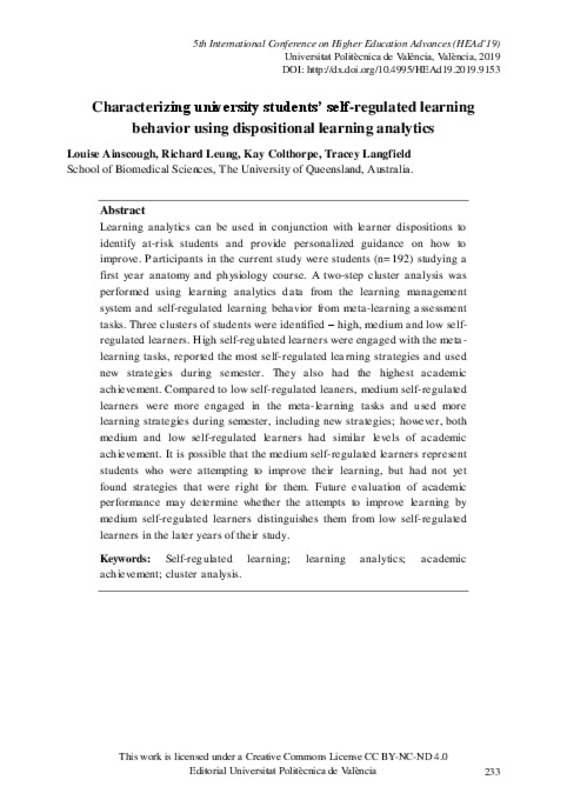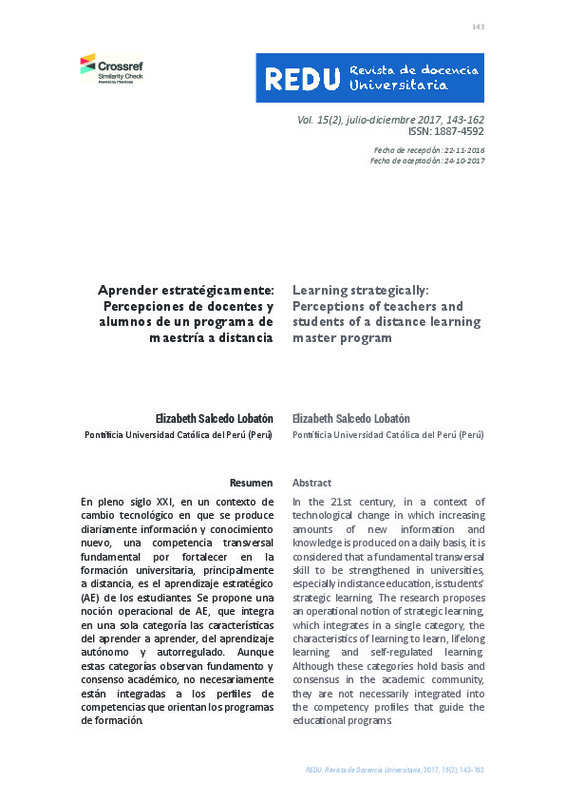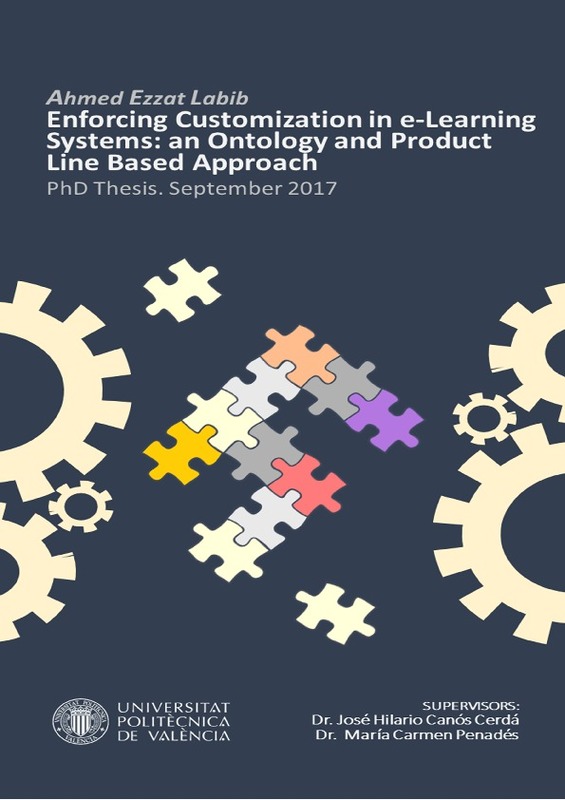JavaScript is disabled for your browser. Some features of this site may not work without it.
Buscar en RiuNet
Listar
Mi cuenta
Estadísticas
Ayuda RiuNet
Admin. UPV
Characterizing university students’ self-regulated learning behavior using dispositional learning analytics
Mostrar el registro sencillo del ítem
Ficheros en el ítem
| dc.contributor.author | Ainscough, Louise
|
es_ES |
| dc.contributor.author | Leung, Richard
|
es_ES |
| dc.contributor.author | Colthorpe, Kay
|
es_ES |
| dc.contributor.author | Langfield, Tracey
|
es_ES |
| dc.date.accessioned | 2019-07-19T06:11:46Z | |
| dc.date.available | 2019-07-19T06:11:46Z | |
| dc.date.issued | 2019-07-05 | |
| dc.identifier.isbn | 9788490486610 | |
| dc.identifier.issn | 2603-5871 | |
| dc.identifier.uri | http://hdl.handle.net/10251/123802 | |
| dc.description.abstract | [EN] Learning analytics can be used in conjunction with learner dispositions to identify at-risk students and provide personalized guidance on how to improve. Participants in the current study were students (n=192) studying a first year anatomy and physiology course. A two-step cluster analysis was performed using learning analytics data from the learning management system and self-regulated learning behavior from meta-learning assessment tasks. Three clusters of students were identified – high, medium and low self-regulated learners. High self-regulated learners were engaged with the meta-learning tasks, reported the most self-regulated learning strategies and used new strategies during semester. They also had the highest academic achievement. Compared to low self-regulated leaners, medium self-regulated learners were more engaged in the meta-learning tasks and used more learning strategies during semester, including new strategies; however, both medium and low self-regulated learners had similar levels of academic achievement. It is possible that the medium self-regulated learners represent students who were attempting to improve their learning, but had not yet found strategies that were right for them. Future evaluation of academic performance may determine whether the attempts to improve learning by medium self-regulated learners distinguishes them from low self-regulated learners in the later years of their study. | es_ES |
| dc.format.extent | 9 | es_ES |
| dc.language | Inglés | es_ES |
| dc.publisher | Editorial Universitat Politècnica de València | es_ES |
| dc.relation.ispartof | HEAD'19. 5th International Conference on Higher Education Advances | es_ES |
| dc.rights | Reconocimiento - No comercial - Sin obra derivada (by-nc-nd) | es_ES |
| dc.subject | Higher Education | es_ES |
| dc.subject | Learning | es_ES |
| dc.subject | Educational systems | es_ES |
| dc.subject | Teaching | es_ES |
| dc.subject | Self-regulated learning | es_ES |
| dc.subject | Learning analytics | es_ES |
| dc.subject | Academic achievement | es_ES |
| dc.subject | Cluster analysis | es_ES |
| dc.title | Characterizing university students’ self-regulated learning behavior using dispositional learning analytics | es_ES |
| dc.type | Capítulo de libro | es_ES |
| dc.type | Comunicación en congreso | es_ES |
| dc.identifier.doi | 10.4995/HEAD19.2019.9153 | |
| dc.rights.accessRights | Abierto | es_ES |
| dc.description.bibliographicCitation | Ainscough, L.; Leung, R.; Colthorpe, K.; Langfield, T. (2019). Characterizing university students’ self-regulated learning behavior using dispositional learning analytics. En HEAD'19. 5th International Conference on Higher Education Advances. Editorial Universitat Politècnica de València. 233-241. https://doi.org/10.4995/HEAD19.2019.9153 | es_ES |
| dc.description.accrualMethod | OCS | es_ES |
| dc.relation.conferencename | Fifth International Conference on Higher Education Advances | es_ES |
| dc.relation.conferencedate | Junio 26-28, 2019 | es_ES |
| dc.relation.conferenceplace | València, Spain | es_ES |
| dc.relation.publisherversion | http://ocs.editorial.upv.es/index.php/HEAD/HEAD19/paper/view/9153 | es_ES |
| dc.description.upvformatpinicio | 233 | es_ES |
| dc.description.upvformatpfin | 241 | es_ES |
| dc.type.version | info:eu-repo/semantics/publishedVersion | es_ES |
| dc.relation.pasarela | OCS\9153 | es_ES |











